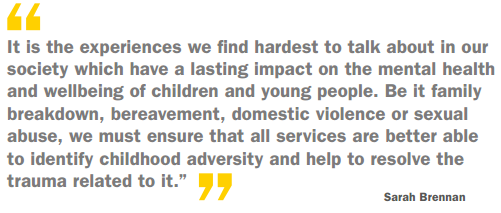Lyndsey Dearlove, VAWG Partnership Manager at Hestia, discusses the topic of mental health as it intertwines with domestic violence.
Organisations across the third sector share the same goal: to provide the best possible support for our services users. In challenging times of ever-growing referrals and tighter financial constraints, it is important that new approaches are taken to maximise best practice both within and across sectors.
Working with partners across education, local government, mental health and more, the UK SAYS NO MORE campaign aims to do just that, creating a UK-wide campaign to end domestic violence and sexual assault.
What we know
In the UK over 1 million women2 and just under a million children will be victims of domestic abuse.
1 in 5 teenagers have been physically abused by their boyfriends or girlfriends.
1 in 4 people in England will experience a mental health problem in any given year. Those living without official diagnosis means numbers are almost definitely higher.
We know that there is an intrinsic link between experiencing domestic violence and developing a mental health condition. With the introduction of the coercive control legislation in December 2015, both specialist domestic abuse services and mental health services are increasing their understanding about how the impact of coercive control on a victim can be long-lasting, regardless of the length of time they experienced it for.
As these effects can manifest themselves in different ways, a coordinated multi-agency approach will be required when providing support. With this increased understanding comes better practice, as the mental health sector and the domestic abuse sector come together under the shared understanding that only together can we end domestic abuse and sexual violence.
“In a recent study, up to 60% of psychiatric in-patients had experienced severe domestic abuse.” (Howard et al, 2010)
“Every year approximately 400 people commit suicide who attended hospital for DA injuries in the previous 6 months. Of these people, 200 of them attended hospital for DA on the day they went onto commit suicide.” (lwa.org.uk)
In their recent study ‘Beyond Adversity’ Young Minds, a UK SAYS NO MORE partner, highlights the impact of witnessing or experiencing a trauma in childhood or early adulthood and its direct impact on a young person’s mental health. It is becoming increasing more evident, through research and from the brave young people who are telling their stories, that young people are experiencing domestic abuse and sexual violence in their own relationships, often at a very young age.
Within these relationships there is pressure to become sexually active, engage in sexual behaviour that makes them feel uncomfortable, and growing pressure to send explicit images of themselves. Abusive partners will often threaten to share these images amongst their peer groups and the victim’s family or friends.
72 per cent of 18-year-olds worry that the prevalence of porn leads to ‘unrealistic attitudes’ to sex, while two-thirds said porn has led to pressure on young women to act a certain way and 68 per cent said it has put pressure on girls to look at certain way. (NSPCC.org)
Going forward
We know that levels of domestic abuse and sexual violence are now at epidemic proportions.
We face growing numbers of people being treated for mental health conditions (1 in 10 children have a diagnosable mental health condition).
We know that the demands placed on specialist support services – both mental health and domestic abuse – are increasing. These services are experiencing record levels of referrals and requests for support, and that this is happening at a time when we are all being asked to do more with fewer resources. We need to meet this challenge by working together, sharing experiences, knowledge, collaborative research and at times resources.
The UK SAYS NO MORE campaign builds on the premise that working together is truly the only way we can end domestic violence and sexual assault.
The UK SAYS NO MORE campaign invites partners from the social care sector, national and local government departments, health, education, the arts and corporate companies to join together to say NO MORE to domestic violence and sexual assault. We have developed campaign materials, including: the UK SAYS NO MORE ‘Excuses’ and ‘Attention’ celebrity PSA videos; a poster campaign featuring NFL football players and university student ambassadors, and a resource pack featuring, ‘How you can help’, and the revolutionary Bright Sky App. All of these resources are available to our partners, and will support you to start the conversation about domestic abuse and sexual violence within your organisation, your teams and with your service users services.
Get in touch
If you would like to discuss the partnership and ways in which we can work together, please contact:
Lyndsey Dearlove: Violence Against Women & Girls (VAWG) Partnership Manager
Lyndsey.dearlove@hestia.org 0207 378 7170
Pamela Zaballa: Head of Policy – Women & Children Services
Pamela.zaballa@hestia.org 0207 378 7160
Find out more about Hestia.

Lyndsey Dearlove is Violence Against Women and Girls Partnership Manager at Hestia for the UK SAYS NO MORE campaign.
You can contact Lyndsey at Lyndsey.Dearlove@hestia.org.



